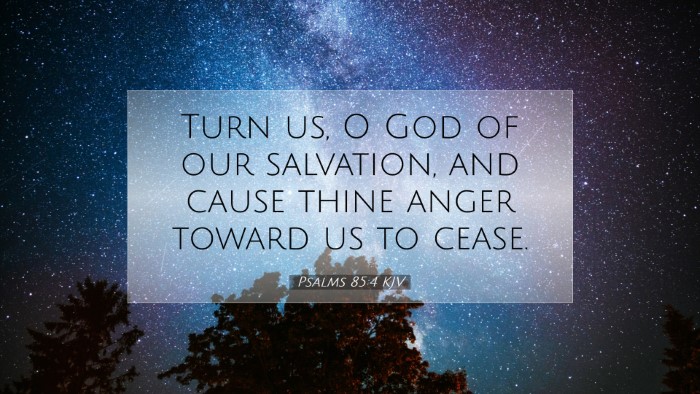Psalms 85:4 - Commentary and Insights
Verse: "Turn us, O God of our salvation, and cause thine anger toward us to cease."
Introduction
Psalms 85:4 serves as a poignant plea for divine restoration and mercy. The verse encapsulates the heart of a community in distress, appealing to God as the source of their salvation. Various public domain commentaries such as those from Matthew Henry, Albert Barnes, and Adam Clarke provide profound insights into this text, exploring its theological implications, historical context, and practical applications for believers.
Thematic Overview
- Call for Restoration: This verse highlights the human need for divine intervention and restoration.
- Divine Anger: The acknowledgment of God's anger indicates an understanding of sin and its consequences.
- Hope in Salvation: The plea is directed to "the God of our salvation," emphasizing reliance on God's mercy.
Contextual Analysis
The context of this psalm is significant as it appears to reflect a time of national calamity for Israel. The psalmist speaks to the collective state of the people, indicating that their relationship with God has been strained, likely due to their sinfulness. In light of this, the call to "turn us" is not just a hope for individual restoration but a communal call for collective repentance and divine favor.
Matthew Henry's Insights
Matthew Henry emphasizes the importance of acknowledging God's sovereign role in the lives of the faithful. He argues that the prayer for turning signifies a recognition that genuine change requires God's action. Henry notes that the plea serves as an implicit confession of sin and a plea for mercy, indicating that true restoration begins with repentance.
Albert Barnes' Commentary
Albert Barnes offers a detailed exposition of the terms in the verse. He explains that the expression "turn us" reflects a desire for God to redirect the hearts of His people. According to Barnes, it is a request for a renewal of God's favor upon Israel, which had perhaps been withdrawn due to disobedience. He also remarks on the phrase "cause thine anger toward us to cease," interpreting it as an acknowledgment of the consequences of sin and a desire for reconciliation with God, which is essential for spiritual revival.
Adam Clarke's Perspective
Adam Clarke provides a nuanced interpretation centered on the communal aspect of the request. He notes that the term "us" includes the whole nation, recognizing that corporate sin affects communal standing before God. Clarke also highlights the holistic nature of the plea, encompassing spiritual, emotional, and physical realms. He encourages readers to see the verse as a model for prayer, where recognition of sin precedes requests for restoration.
Theological Implications
This verse encapsulates core theological principles about sin, repentance, and the need for divine grace. The acknowledgment of God’s anger underscores the seriousness of sin and its impact on humanity’s relationship with the Creator.
- Sin and Divine Justice: The anger of God reflects His holiness and justice, highlighting that sin cannot be overlooked.
- Repentance: The request to "turn us" signifies genuine repentance and the recognition of the need for God's help in returning to a right relationship.
- Hope and Assurance: There is hope inherent in the title "God of our salvation," reaffirming the biblical theme that God provides a way back to restoration.
Practical Applications
The insights drawn from this verse can be powerful guides for pastors, students, theologians, and scholars. Here are some applications that emerge from the text:
- Prayer and Confession: Encourage personal and communal prayer that acknowledges sin and seeks God's mercy.
- Study of God's Character: Delve into biblical attributes of God, particularly His justice and merciful nature.
- Revival and Renewal: Use the text as a basis for seeking spiritual revival both personally and within the church community.
Conclusion
Psalms 85:4 serves as a heartfelt appeal for divine intervention amid human failure. The reflections from Matthew Henry, Albert Barnes, and Adam Clarke deepen our understanding of this verse, inviting us into a posture of repentance and renewal. As we encounter this scripture, let us embrace its call to seek God's face and restoration, recognizing that in turning toward Him, we find our true salvation.


